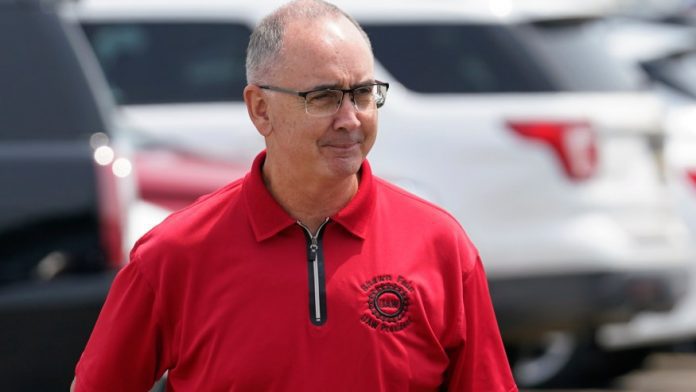The United Auto Workers (UAW) union is set to demand the largest pay increase on record as it continues contract negotiations with car manufacturers Stellantis, Ford and General Motors.
The raise, divided into yearly increments, would ultimately boost auto worker pay by 46%. The first 20% increase would be effective once the new contract is signed by Detroit car manufacturers, with additional 5% raises implemented annually until 2027. The top-earning union members would eventually make $47.14 an hour, nearly $15 more than the current maximum hourly rate of $32.32. UAW president Shawn Fain, who has promised to aggressively pursue the organization’s interests in the face of “corporate greed,” revealed the wage demands in an overview of the union’s proposed contract released Tuesday. Fain took to Facebook the same day to explain his reasoning. “Big Three CEOs saw their pay spike 40% on average over the last four years…We know our members are worth the same and more,” he commented. As evidence, Fain pointed to Mary Barra, General Motors CEO, whose total pay for 2022 amounted to $29 million, up 34% from the year before. A majority of Barra’s earnings came from benefits, as her $2.1 million salary remained unadjusted throughout the period.
Two of the Detroit Three car manufacturers responded to Fain’s comments over the course of the week. Ford spokesperson Kelli Felker stated the company would continue negotiating with the UAW to develop “creative solutions during this time when our dramatically changing industry needs a skilled and competitive workforce more than ever.” General Motors appeared less outwardly receptive to the union’s proposed price, although the company has confirmed it is amenable to a wage hike. “The breadth and scope of the Presidential Demands, at face value, would threaten our ability to do what’s right for the long-term benefit of the team. A fair agreement rewards our employees and also enables GM to maintain our momentum now and into the future. We think it’s important to protect U.S. manufacturing and jobs in an industry that is dominated by non-unionized competition.” Although it is perhaps the least interested in entertaining a significant wage increase, Stellantis has yet to respond directly to Fain’s demands.
While its requests may sound extreme, the raises pitched by the UAW do have some precedent. In its report, The Detroit News notes that the International Brotherhood of Teamsters, a labor union active in both the U.S. and Canada, recently negotiated an average top rate of $49 per hour with UPS, slightly above the $47.14 requested by Fain. Workers are also experiencing rising living costs in an economy undergoing intense inflation and interest rate hikes. Should it fail to score a win against The Detroit Three, the union may resort to a labor strike, a decision which could heavily impact dealers, car manufacturers, consumers and auto workers in the months to come.





